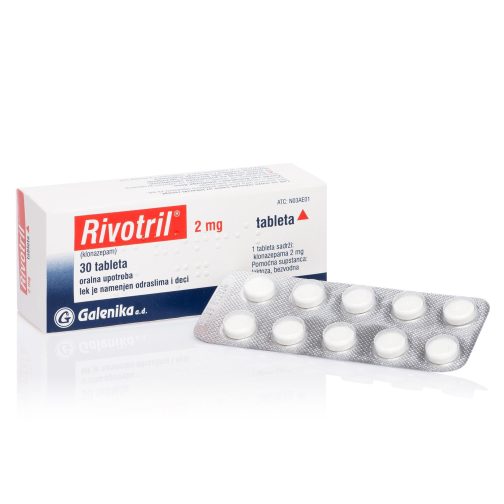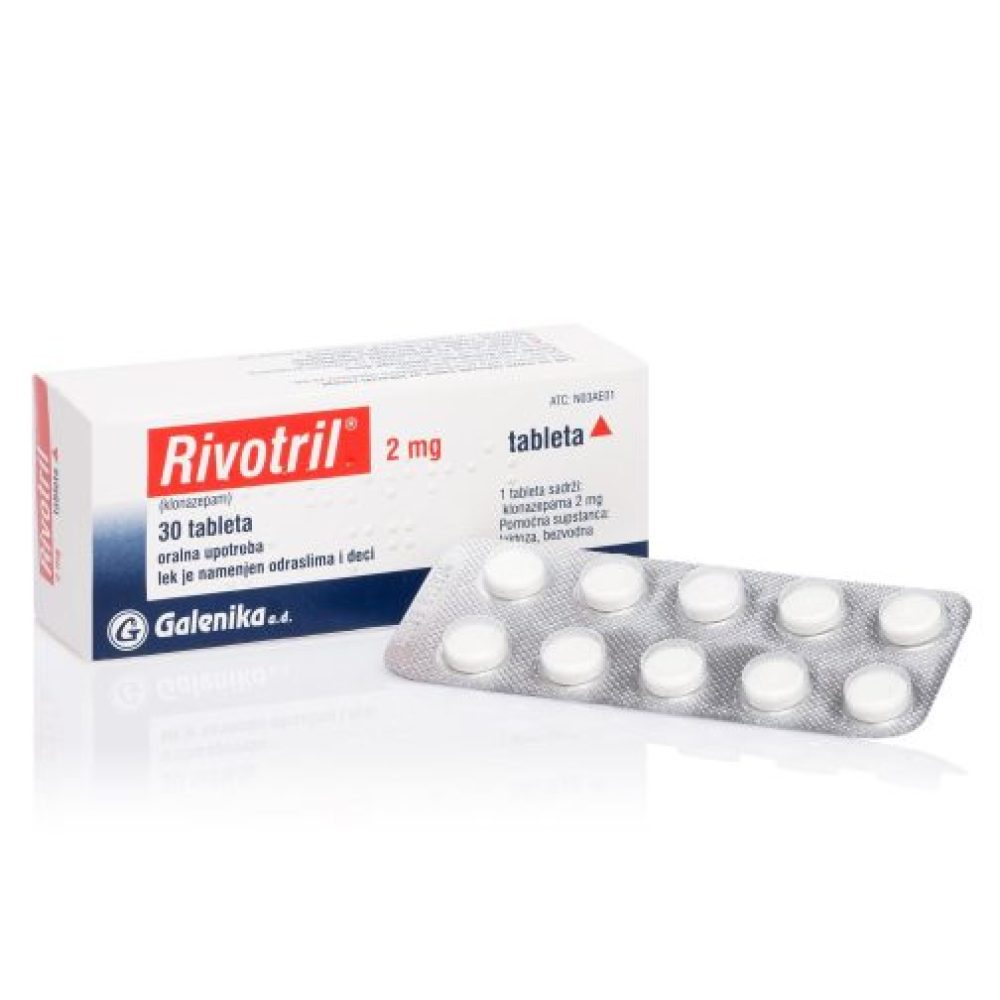clonazepam Rivotril 2mg
- Home
- Product Details
Description
Sleep is the foundation of good health, but for many, insomnia and sleeplessness create a barrier to rest. Imagine lying in bed, exhausted but unable to drift into sleep. It’s frustrating, isn’t it? Many people around the world suffer from these conditions, and it’s not uncommon for those battling sleepless nights to seek medical assistance. One medication that has gained attention for its potential to help with insomnia and other sleep-related issues is Clonazepam Rivotril 2mg. But what is Clonazepam? How does it work, and can it really be the answer to a better night’s sleep?
In this blog, we’ll dive deep into Clonazepam’s role in treating insomnia and sleeplessness, exploring its benefits, potential risks, and how it works. We’ll also look at the medication’s mechanism of action, side effects, and whether it’s the right fit for those struggling with sleep issues. Let’s embark on this journey to understand the relationship between Clonazepam and restful sleep.
What is Clonazepam Rivotril 2mg?
Clonazepam, often sold under the brand name Klonopin, belongs to a class of medications known as benzodiazepines. Initially developed for the treatment of seizure disorders, Clonazepam also possesses sedative properties, making it useful for treating anxiety, panic disorders, and, more recently, insomnia. Benzodiazepines like Clonazepam work by affecting neurotransmitters in the brain, specifically gamma-aminobutyric acid (GABA), which helps calm neural activity. This calming effect can help individuals relax, making it easier to fall and stay asleep.
However, Clonazepam isn’t primarily marketed as a sleep aid. It’s commonly prescribed for anxiety and panic disorders, but its sedative properties make it helpful for short-term relief of insomnia, particularly when anxiety or stress is the root cause of sleeplessness.
Insomnia: A Global Issue
Before diving deeper into how Clonazepam can help with sleeplessness, let’s first understand the gravity of insomnia. Insomnia affects millions worldwide, with many struggling to get the recommended 7-9 hours of sleep per night. Whether it’s trouble falling asleep, staying asleep, or waking up too early, the impact of poor sleep on physical and mental health is profound.
Insomnia can be caused by various factors:
- Stress and Anxiety: Mental health conditions are a major contributor to sleeplessness. Racing thoughts and feelings of unease often keep people awake.
- Medical Conditions: Chronic illnesses such as asthma, heart disease, or chronic pain can make falling asleep difficult.
- Environmental Factors: Noise, light, or an uncomfortable sleeping environment can also lead to poor sleep.
- Lifestyle Choices: Caffeine, alcohol, irregular sleep schedules, and excessive screen time can disrupt your natural sleep cycle.
The common thread between these causes is that they all stimulate the brain, keeping it more active than it should be when you’re trying to sleep. This is where medications like Clonazepam come in handy.
How Clonazepam Works to Alleviate Sleeplessness
Clonazepam Rivotril 2mg enhances the effects of GABA, a naturally occurring brain chemical that promotes relaxation. When GABA levels rise, brain activity slows down, making it easier for the mind to calm itself. For people who suffer from insomnia due to anxiety or heightened brain activity, this process can make a significant difference.
Here’s a closer look at how Clonazepam helps:
- Calming the Mind: The primary effect of Clonazepam is reducing the activity of neurons in the brain. If anxiety or stress is keeping someone awake, this sedative effect helps quiet the mind and ease the person into sleep.
- Prolonging Sleep: One of the most common complaints from insomnia sufferers is waking up throughout the night. Clonazepam has a relatively long half-life, meaning it stays in the system for an extended period, helping to maintain sleep longer than some other sleep aids.
- Relief from Restlessness: Some individuals find themselves tossing and turning due to restless legs or an overactive nervous system. Clonazepam, by calming these nerves, can reduce that discomfort, allowing the body to settle into a state conducive to rest.
The Benefits of Clonazepam for Insomnia
Given its sedative properties, Clonazepam Rivotril 2mg has become a tool for many dealing with chronic sleeplessness, especially those with anxiety-related insomnia. Here are some of the key benefits of using Clonazepam for sleep disorders:
- Effective for Anxiety-Induced Insomnia: For individuals whose sleeplessness is driven by anxiety, Clonazepam can be a game-changer. It addresses both the anxiety and the insomnia, providing a more holistic solution than standard sleep medications.
- Longer Sleep Duration: Due to its relatively long half-life, Clonazepam is especially effective in preventing middle-of-the-night awakenings. People can enjoy longer periods of uninterrupted sleep, which is essential for achieving restorative rest.
- Less Frequent Dosing: Unlike some sleep medications that need to be taken frequently or have a short duration of action, Clonazepam can often be used in lower doses, reducing the risk of developing tolerance or dependence.
- Relief for Restless Legs Syndrome (RLS): For people whose sleeplessness stems from conditions like RLS, Clonazepam’s ability to relax muscles and reduce nerve agitation can be invaluable.
The Risks and Side Effects of Clonazepam
While Clonazepam Rivotril 2mg can be helpful for treating insomnia, it is not without risks. Like all benzodiazepines, Clonazepam carries a potential for dependence, meaning that over time, the body can become reliant on the medication to achieve sleep. This makes Clonazepam more suited for short-term use in addressing sleeplessness rather than a long-term solution.
Some common side effects include:
- Drowsiness: The calming effects of Clonazepam can linger into the following day, leading to grogginess or difficulty concentrating.
- Coordination Problems: Because Clonazepam affects the brain’s motor control centers, it may cause dizziness or issues with balance, increasing the risk of falls, particularly in older adults.
- Memory Issues: Some people experience short-term memory impairment when using Clonazepam, making it difficult to recall details or events.
- Dependence and Withdrawal: Long-term use of Clonazepam can lead to physical and psychological dependence. When the medication is stopped, withdrawal symptoms—such as rebound insomnia, anxiety, and irritability—can occur.
For these reasons, it’s essential to use Clonazepam under the strict guidance of a healthcare provider. They can ensure that the benefits outweigh the risks for each individual, and they can provide the appropriate tapering schedule if discontinuation is necessary.
Is Clonazepam Right for You?
The decision to use Clonazepam Rivotril 2mg for insomnia should be made in consultation with a healthcare provider. Clonazepam is typically reserve for those who have not respond to other treatments, particularly if anxiety or restlessness is at the root of sleeplessness. In some cases, healthcare providers may prescribe Clonazepam in conjunction with other treatments, such as cognitive-behavioral therapy (CBT), to help patients develop healthier sleep habits.
For short-term treatment, Clonazepam can be an effective solution. However, due to the potential for dependence and withdrawal, it’s not typically recommend as a long-term solution for insomnia. In many cases, doctors will opt for medications that are less likely to cause dependence, such as non-benzodiazepine sleep aids or melatonin receptor agonists.
Alternatives to Clonazepam for Sleeplessness
For those looking to avoid the risks associated with Clonazepam, there are several alternatives to consider:
- Cognitive-Behavioral Therapy for Insomnia (CBT-I): This form of therapy helps individuals develop healthier sleep habits and addresses. The underlying causes of sleeplessness, making it an effective long-term solution without the need for medication.
- Non-Benzodiazepine Sleep Aids: Drugs like zolpidem (Ambien) or eszopiclone (Lunesta) can help promote sleep without the same level of dependency risk as benzodiazepines.
- Lifestyle Modifications: Sometimes, simple changes in routine can make a big difference. Reducing caffeine intake, establishing a regular sleep schedule, and creating a relaxing bedtime routine are just a few ways to improve sleep quality naturally.
- Melatonin Supplements: Melatonin is a natural hormone that regulates the sleep-wake cycle. For some individuals, melatonin supplements can be an effective and non-addictive alternative to prescription sleep medications.
Conclusion: Clonazepam and the Quest for Restful Sleep
Sleep is crucial for overall health and well-being, yet many individuals struggle with insomnia and sleeplessness. While Clonazepam can offer short-term relief for those whose sleep is disrupter by anxiety or nervous system agitation. It’s important to recognize that it is not a long-term solution. The potential risks, including dependence and withdrawal, mean that Clonazepam should be use cautiously and under medical supervision.
For those exploring options to manage sleeplessness. Clonazepam can be a tool in the toolkit, but it’s worth considering other treatments. Such as lifestyle modifications, therapy, and alternative medications, as well. In the end, the key to overcoming insomnia is not just in the medication. But in understanding the root cause of the sleeplessness and addressing it with a balanced approach.
Additional information
| Quantity | 30, 50, 60, 90, 120, 150, 240 |
|---|















Reviews
There are no reviews yet.